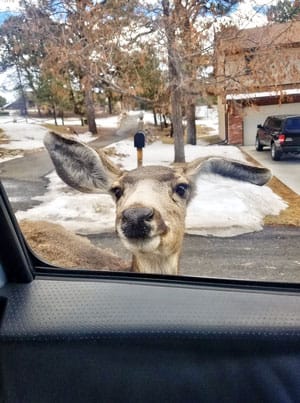Only petting zoo animals are meant to be fed

Hello there! A friendly deer greets a neighbor’s car in Douglas County
By Barbara Neff; photo courtesy of Timothy Corey
Mountain lions, coyotes, bears, elk, deer and a host of smaller game are our neighbors here in Douglas County, but they are not necessarily our friends nor should they be our dinner guests.
Though the message is abundantly clear, and in spite of constant warnings about how feeding wildlife harms them, weekly reports of people feeding wildlife circulate among Douglas County residents and on local social media.
Tracking how many of our wild animals become sick and die as the result of human interference would be impossible. According to wildlife experts, between the steady supply of human food, which draws animals into unsafe situations, and the steady diets of foods that makes them ill, we lose wildlife to human thoughtlessness daily.
Craig Miller, parks and open space manager for the Castle Pines North Metropolitan District (CPNMD), weighed in on this frustrating matter.
“Observe, enjoy and photograph wildlife from a safe distance, but do not invade their space,” stated Miller. “Humans feeding wildlife upsets nature’s balance. It can lead to over-population, which increases competition for food, which then leads to aggression. Over-population also leads to degradation of wildlife habitat and a loss of biodiversity.”
Miller believes people who feed wildlife fall into two groups, those who actually believe they are doing wildlife a favor – especially in winter, and those who simply want to attract wildlife for their own viewing pleasure.
Miller also reminds us that Colorado does have a law against feeding big game. He went on to explain that even feeding smaller animals, though not against the law, has negative consequences for wildlife and humans alike.
Feeding small animals contributes to a concentration of them in an area they might not naturally inhabit, which in turn draws predators to an area that might not naturally interest them. Predators who arrive for small game do not distinguish between a rabbit and a family pet. Once large game habitually visit a residential area in search of food, they typically have to be euthanized.
Even bird feeders can present a hazard if not properly placed and designed. Hanging bird feeders can be quite safe as long as falling seed – which creates a food source for rodents – is minimized and the feeders are not placed near open areas known to host bears. Feeders not user-friendly to squirrels are also preferable.
Miller encouraged residents to stop by the CPNMD office at 7404 Yorkshire Drive in Castle Pines for free literature regarding the dangers of feeding wildlife. Visit cpw.state.co.us for additional information about the impacts of feeding wildlife and the unforeseen consequences.